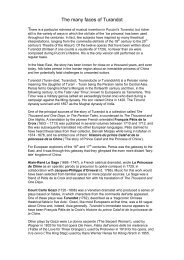NEF-Southampton-Positive-Money-ICB-Submission
NEF-Southampton-Positive-Money-ICB-Submission
NEF-Southampton-Positive-Money-ICB-Submission
You also want an ePaper? Increase the reach of your titles
YUMPU automatically turns print PDFs into web optimized ePapers that Google loves.
Those individuals (bank staff) and companies (banks) with control over the money supply have no oversight<br />
of the whole economy. In contrast, the Monetary Policy CommiOee would have big-‐picture oversight of the<br />
economy, with the remit to consider the needs of the wider economy before making a decision on altering<br />
the money supply.<br />
In addiGon, the MPC is the only insGtuGon with no conflict of interest and an alignment of incenGves with the<br />
needs of the economy. The members of the MPC could be rewarded for achieving a target rate of low and<br />
steady inflaGon, and creaGng too much money would result in them losing this potenGal reward. In contrast,<br />
both banks and elected poliGcians would get a reward – in the short-‐term at least – by increasing the money<br />
supply excessively, even if to do so was against the best interests of the economy.<br />
6. ‘Full-‐reserve banking would force banks to leave the UK’<br />
The full-‐reserve banking requirements would apply to any bank that deals in pound sterling and which<br />
therefore requires accounts at the Bank of England. In other words, any bank wishing to do business in pound<br />
sterling would need to operate under the full-‐reserve banking rules. Being registered or located abroad would<br />
not help the bank circumvent the changes.<br />
In short, full-‐reserve banking is completely unlike changes such as bank levies or a ‘Glass-‐Steagal’-‐type change<br />
– there is no way to circumvent it, as long as a bank wants access to the huge sterling lending market.<br />
29



